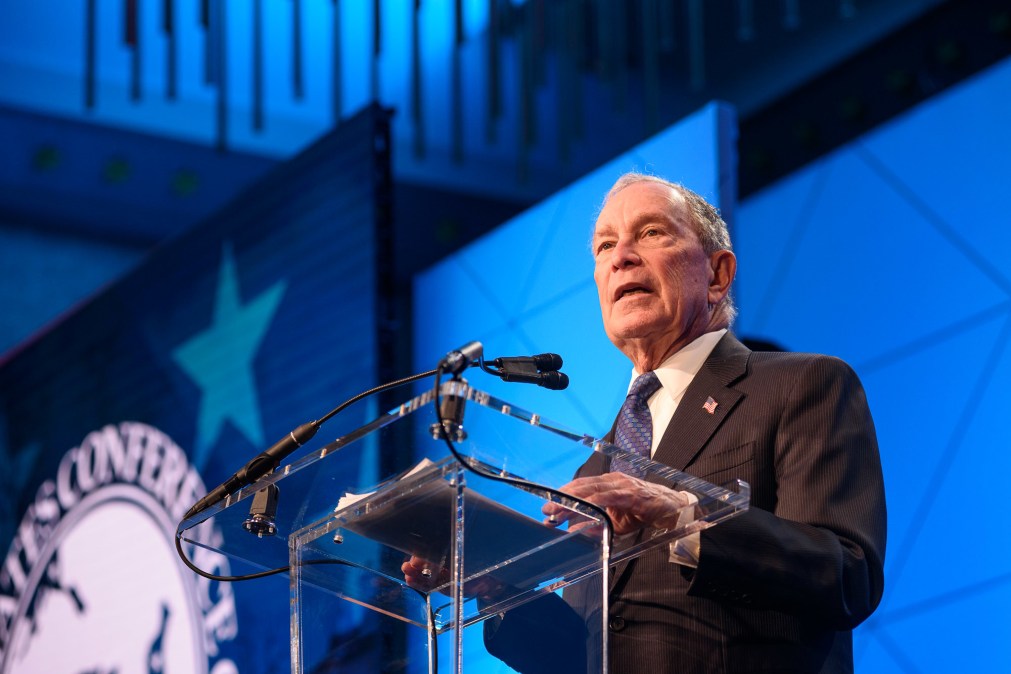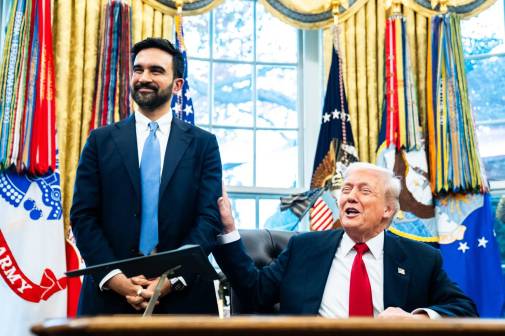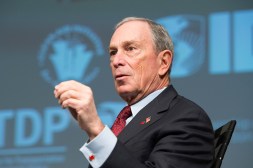Courting mayors, Bloomberg says he’ll bring data-driven ‘smart’ policies to White House

Former New York Mayor Michael Bloomberg on Wednesday courted more than 270 mayors to support his bid for the Democratic Party’s presidential nomination by framing his potential presidency as a continuation of his “smart city” policies around transportation, infrastructure and environmental protection.
Bloomberg, who joined a crowded Democratic field in late November, made his pitch to U.S. Conference of Mayors winter meeting in Washington. During the presentation, which was preceded by attendees receiving “Mayors for Mike” brochures, he revealed an infrastructure plan designed to create “smarter, faster, safer, and greener” roads, railways, bridges and power and energy grids.
To do so, Bloomberg said, he’ll commission the creation of the first-ever “national map” to trace the routes of all road, rail, transit, air and freight routes in the United States. The idea is to leverage public and private sector data to find gaps and obstacles in the current transportation ecosystem. At the core of this plan, which would invest well over $1 trillion into national infrastructure improvements, is a reliance on data and measured accountability that Bloomberg said is lacking in federal infrastructure grants today. The plan also bears similarities to the 2007 “PlaNYC” initiative Bloomberg launched while mayor.
“We’ll create clear metrics measuring the health of our infrastructure and the success of our investments. More and more American cities are doing that, including many of yours. Our foundation would be glad to help,” Bloomberg said. “I think it’s time the federal government caught up to what mayors are doing.”
Bloomberg was in his element among the mayors, who welcomed him with a standing ovation and loud cheers. Many held up their phones to snap a distant photo of their one-time peer, and repeated their applause whenever he touted the roles mayors play.
Since launching its Cities of Service program in 2009, Bloomberg’s private foundation has dedicated at least $350 million in grants to promote technical, data-driven projects in cities, playing an indisputable role in encouraging municipal leaders to take technological, measured approaches to common problems like traffic or pollution. Several mayors whose cities have been on the receiving end of Bloomberg’s philanthropy were quick to endorse the candidacy of the former New York mayor and media mogul, who has an estimated net worth of more than $50 billion.
Just as it’s common for smart-cities programs to rely on data to predict where and when investment will be needed the most, Bloomberg said Wednesday that he would hold states accountable by using metrics to measure the success of his hypothetical administration’s infrastructure and environmental projects.
“Data measurement will lead to smarter investment and more accountability,” he said.
In addition to changing how the federal government would collect data on infrastructure — like issuing report cards on the health of ongoing state projects that make use of federal funds — Bloomberg’s infrastructure plan would also employ smaller-scale projects, like building an electric vehicle charging station every 50 miles along interstate highways and establishing a path for all new buildings to being emissions-free and “hyper-efficient” by 2025. The plan also calls for the completion of three high-speed rail corridors by 2030, and $100 billion for clean water nationally over 10 years.
“The plan we released will allow us to make progress on all current infrastructure challenges we face,” Bloomberg said.
Bloomberg joked that his campaign has its own U.S. Conference of Mayors, with five national co-chairs being former or current mayors, including former Miami Mayor Manny Diaz, former Philadelphia Mayor Michael Nutter and current mayors Steve Benjamin of Columbia, South Carolina, Michael Tubbs of Stockton, California, and Greg Fischer of Louisville, Kentucky. Bloomberg’s campaign also announced the endorsements of 11 more mayors on Wednesday, bringing the total to 20 overall. He also began his speech with an overture to D.C. Mayor Muriel Bowser, saying that he looks forward to calling her “Governor Bowser,” a nod to the District’s ambitions to become a fully fledged state. (While Bowser called Bloomberg an “important voice” upon his entry into the presidential race, she has not endorsed any candidate.)
During Bloomberg’s speech, he also promised mayors that if he becomes president, the doors to the White House will be open for local leaders in an unprecedented fashion.
“If I become president, I can just promise you that the doors to the White House will be open to mayors, because the policies that president designs often are implemented not at the state level, but at the local level,” Bloomberg said. “You will have a seat at the table in ways that have never happened before.”






